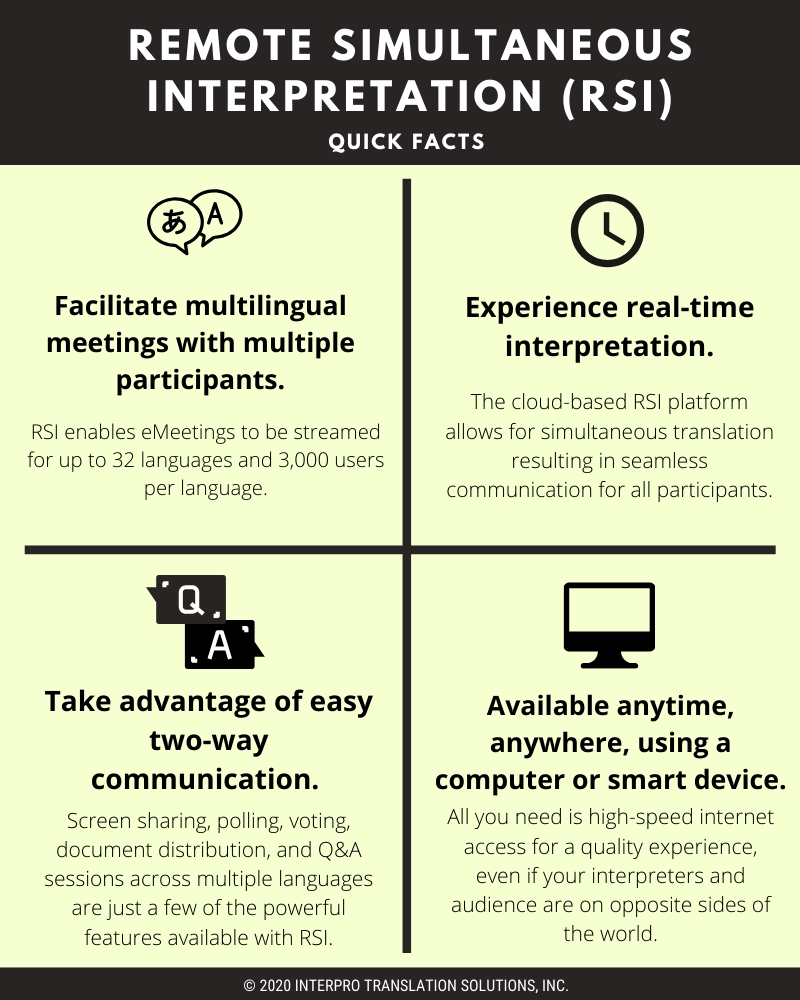Meetings are a part of everyday business for most organizations around the world. Technology has eliminated the barriers of physical distance, allowing attendees to connect and collaborate through virtual conferences, webinars, classes, and more. But in today’s global market, providing these in only one language often falls short. Remote Simultaneous Interpretation (RSI) provides a game-changing advantage to ensuring that nobody in your organization is left behind due to linguistic issues.
There’s more to virtual gatherings and interpretation than meets the eye. We’re here to break down the importance of web meetings, what RSI is and how it works, and what the future of online events might look like.
Why are eMeetings essential for businesses?
Web meetings encompass more than just one-on-one video calls. In the modern-day business landscape, web meetings or “eMeetings” are utilized for a variety of purposes including eLearning, team or organization-wide conferences, presentations, webinars, and seminars.
What was once considered a nice-to-have option in the workplace is quickly evolving into a necessity for businesses around the globe. Companies cannot overlook the benefits of web meetings, including:
Efficiency
Virtual meetings save businesses money associated with planning in-person gatherings. Forgoing travel and related expenses can save thousands of dollars over the course of just one year. Additionally, in-person meetings require a great deal of time. Remote meetings, on the other hand, can be quick and to the point, resulting in increased productivity.
Scalability
Coordinating in-person training for 5 employees in one office isn’t difficult, but the situation changes drastically when it’s 500 employees across several offices around the globe. Web meetings, on the other hand, can be implemented as easily for 1,000 participants as it can for 10, anywhere in the world, and at the touch of a button.
Flexibility
The possibilities with web meetings are endless. As long as members have an internet connection, they have the ability to participate. Sometimes the unexpected throws a wrench in plans, as the world learned this year with the coronavirus pandemic. Virtual events are, for the most part, unaffected by these obstacles. Even if things don’t go according to plan, canceling online meetings and events is not nearly as inconvenient as canceling in-person ones.
However, if you aren’t providing virtual resources to all members of your company due to language barriers, many will miss out on these benefits. Remote Simultaneous Interpretation is a solution to this problem.
What is Remote Simultaneous Interpretation (RSI)?

With Remote Simultaneous Interpretation, audio is translated by remote interpreters in real-time. Unlike traditional consecutive interpretation methods, RSI does not interrupt the speech in progress, preserving the natural flow of the presentation.
Additionally, when utilizing Interpro’s professional linguists in tandem with an optimized RSI platform, two-way interaction is possible, no matter the language of the speakers.
To better illustrate this, imagine a presenter leading an online seminar in English. Her remote audience is composed of English, French, and Spanish speakers. Though she is delivering her presentation in English, the French and Spanish speakers will hear it immediately in their respective languages only. Furthermore, if anyone has a question, they can ask it in their native language. The English-speaking presenter will hear the question in English.
Remote Simultaneous Interpretation allows you to:
- facilitate eMeetings with up to 32 languages simultaneously
- host up to 3,000 attendees per language
- access meetings through your computer or smart device
- plan for interpretation services with greater flexibility thanks to short ramp-up times
Why Interpretation Is Key for Businesses
Interpretation does more for a business than allow them to reach more members of the organization. It is a crucial step in breaking down linguistic barriers and actively promoting language equity. The end result? No member of your organization will be at a disadvantage due to the language they speak, affording them every opportunity to succeed.
Offering multilingual sessions for foreign language speakers makes learning accessible to all, creating an environment where everyone feels welcome. Remote Simultaneous Interpretation is key to building a diverse and inclusive organization.
How does Remote Simultaneous Interpretation work?
Thirty-two languages and 3,000 users sounds like a complex proposition! Thankfully, when using a professional translation company and the right platform, it is a seamless experience.
Remote Simultaneous Interpretation for multilingual web meetings can be broken down in three simple steps:
- First, the presenter speaks in his/her native language as if talking to a group of people who also speaks that language. The presentation is streamed within the cloud-based RSI platform.
- There’s no need for the speaker to pause for interpretation to occur. The interpreter, who wears headphones, is listening to the speaker and simultaneously interpreting into a microphone. The translation is streamed back to the RSI platform.
- From the same platform, the audience receives the interpretation in its desired language. The result is a video stream that makes the audience feel as if they are actually listening to a speaker of their native language.
If an audience member has a question or wishes to respond, the same process will take place, only vice versa. Keep in mind that even though we have broken the process down into three separate steps for descriptive purposes, it occurs almost instantaneously.
Using the Optimum Platform for Interpretation
Platforms like Zoom and Google Teams are great for monolingual communication, but fall short when multiple languages are involved. In order for interpretation to take place on these platforms, multiple technologies, none of which was built for each other, may need to be deployed at the same time. The bottom line is that these services are not designed for multilingual interpretation, making the process cumbersome and ineffective at times.
Platforms which were not designed with multi-language meetings in mind should be avoided when hosting eMeetings with a linguistically diverse audience. A web-based RSI platform allows audiences to listen in on meetings, webinars, and presentations in real-time and to communicate back in their native language.
Other benefits of using a specialized platform like Interpro’s solution include:
- high-definition audio and video
- user-friendly easy navigation
- features such as polling, voting, document distribution, and Q&A capabilities
- screen sharing
- high-level security
Conventional video conferencing platforms simply don’t include these features across multiple languages simultaneously.
The Future of Online Live Events
The COVID-19 pandemic has altered the way companies communicate and conduct business, and these changes are most likely here to stay for the foreseeable future. Social distancing guidelines have prohibited large gatherings of people, effectively halting live meetings and events across the globe.
An article from EventMB, a leader in resources for the event industry, examined the future of in-person events. Planning large gatherings will be nearly impossible due to the precautions that need to be taken, making virtual meetings the only viable option. Prominent companies such as Facebook and Microsoft are leading the way in postponing conferences and large meetings until Summer 2021. Others have already taken this a step farther. Twitter made news when their CEO announced that all employees can work from home forever.
Marketing experts are seeing positive results with digital experiences and events, noting increased ROI and higher attendance rates than their in-person counterparts. Making sure these online events and meetings are accessible to all is more important now than ever. Though separated by physical distance, technology such as RSI can help people collaborate and work together, regardless of language.
Conclusion
eMeetings have rapidly evolved into a critical element for business communication in today’s world, and organizations must take steps to effectively reach the widest possible audience. Remote Simultaneous Interpretation seamlessly enables multilingual communication, allowing people to collaborate in the language they understand best and are most comfortable using.


